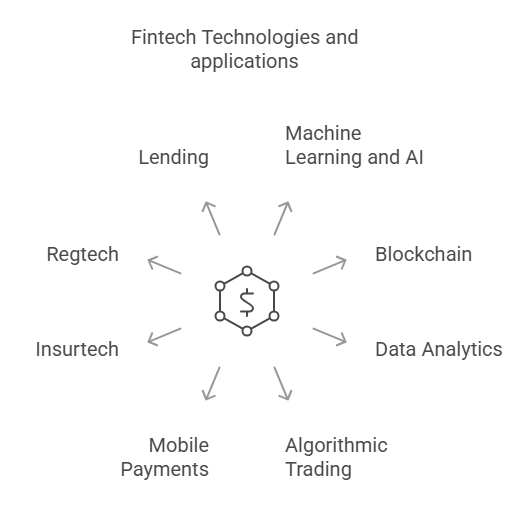Fintech Applications in Banking, Non-Banking Financial Services; Insurance; Payment; Lending; Audit and Compliance
Fintech, a portmanteau of "financial technology," is revolutionizing the Indian financial landscape. It leverages technology to enhance and automate financial services, making them more efficient, accessible, and user-friendly.
Overview
Fintech applications are transforming traditional financial processes, impacting banking, non-banking financial services (NBFCs), and the insurance industry. Key aspects include:
- Increased Efficiency: Automation and digitization streamline operations, reducing costs and processing times.
- Enhanced Customer Experience: Personalized services, mobile accessibility, and seamless transactions improve customer satisfaction.
- Improved Financial Inclusion: Fintech expands access to financial services for underserved populations.
- Data-Driven Decision Making: Analytics and AI enable better risk assessment, fraud detection, and personalized offerings.
Key Fintech Technologies and Applications
Here's a breakdown of the core technologies and their applications across the BFSI (Banking, Financial Services, and Insurance) sector in India:
1. Machine Learning (ML) and Artificial Intelligence (AI):
- Explanation: AI and ML enable machines to learn from data, automate tasks, and make intelligent decisions.
-
Applications:
- Credit Scoring: AI algorithms analyze vast datasets to assess creditworthiness more accurately.
- Fraud Detection: ML identifies suspicious patterns and anomalies to prevent fraudulent transactions.
- Customer Engagement: Chatbots and virtual assistants provide personalized customer support.
- Robo-Advisors: Automated investment platforms offer personalized financial advice.
- KYC (Know Your Customer): ML automates the verification process, reducing manual effort and improving accuracy.
- Loan Underwriting: speeds up the loan approval process.
- Personalised Contactless Customer Experiences: Automating processes to improve customer interactions.
2. Blockchain:
- Explanation: A distributed ledger technology that enables secure and transparent record-keeping.
-
Applications:
- Secure Transactions: Enhances security and transparency in financial transactions.
- Cross-Border Payments: Facilitates faster and cheaper international money transfers.
- Trade Finance: Streamlines trade processes and reduces fraud.
- Digital Currencies: Supports the development and use of cryptocurrencies.
- Anti-Money Laundering (AML): Improves tracking and reporting of suspicious transactions.
- Client Identification: Securely stores and verifies customer identity data.
- Stock trading applications: Tracing financial transactions.
3. Data Analytics and Big Data:
- Explanation: Analyzing large datasets to extract valuable insights and trends.
-
Applications:
- Customer Segmentation: Identifies customer preferences and behaviors for targeted marketing.
- Risk Management: Assesses and mitigates financial risks.
- Predictive Analytics: Forecasts future trends and customer behavior.
- Fraud Detection: Identifies suspicious patterns and anomalies.
- Market Research: Understanding market trends and customer needs.
4. Algorithmic Trading:
- Explanation: Using algorithms to automate trading decisions based on predefined rules.
-
Applications:
- Automated Trading: Executes trades quickly and efficiently.
- Market Analysis: Analyzes market data to identify trading opportunities.
- Risk Management: Manages trading risks through automated strategies.
5. Mobile Payments:
- Explanation: Enables financial transactions through mobile devices.
-
Applications:
- Digital Wallets: Facilitates cashless transactions and peer-to-peer payments (e.g., Paytm, Google Pay, PhonePe).
- Mobile Banking: Provides access to banking services through mobile apps.
- QR Code Payments: Enables contactless payments at retail outlets.
6. Insurtech:
- Explanation: Applying technology to improve insurance processes and services.
-
Applications:
- Personalized Insurance Products: Tailors insurance policies to individual needs.
- Online Claims Processing: Streamlines the claims process and reduces paperwork.
- Data-Driven Risk Assessment: Uses data to assess and price insurance risks.
- Policy Administration: Online management of insurance policies.
7. Regtech:
- Explanation: Using technology to automate regulatory compliance processes.
-
Applications:
- AML/KYC Compliance: Automates compliance checks and reporting.
- Regulatory Reporting: Streamlines the submission of regulatory reports.
- Risk Monitoring: Monitors compliance risks and ensures adherence to regulations.
- Corporate Tax Filings: Automates the process of tax document submission.
8. Lending
- Peer-to-peer lending (P2P) platforms (e.g., Faircent, LenDenClub).
- AI-powered credit risk analysis for instant loan approvals.
9. Audit and Compliance
- Regtech solutions for automated compliance monitoring.
- AI and blockchain for fraud detection and transparency.
Impact on Indian BFSI
- Increased financial inclusion through mobile banking and digital payments.
- Improved efficiency and reduced costs for financial institutions.
- Enhanced customer experience through personalized services and digital channels.
- Increased transparency and security in financial transactions.
- Enhanced fraud detection and risk management capabilities.
Fintech continues to reshape the Indian financial landscape, driving innovation and creating new opportunities for businesses and consumers alike.


No Comments